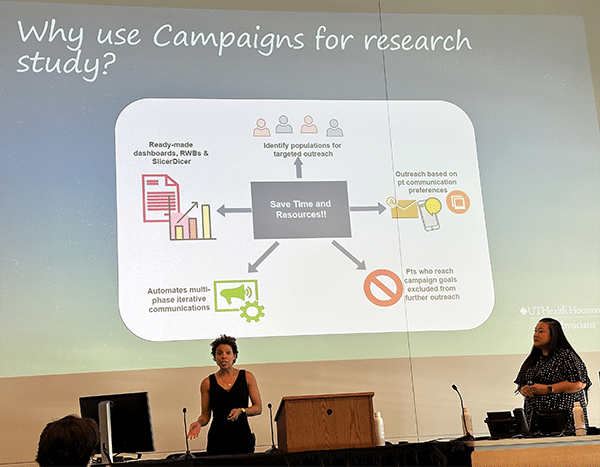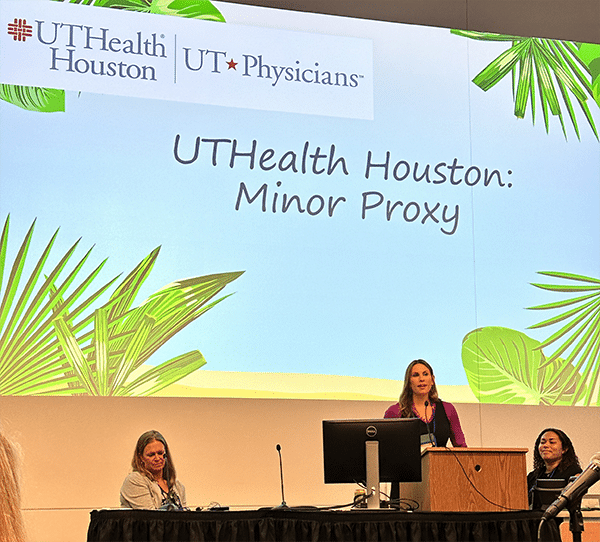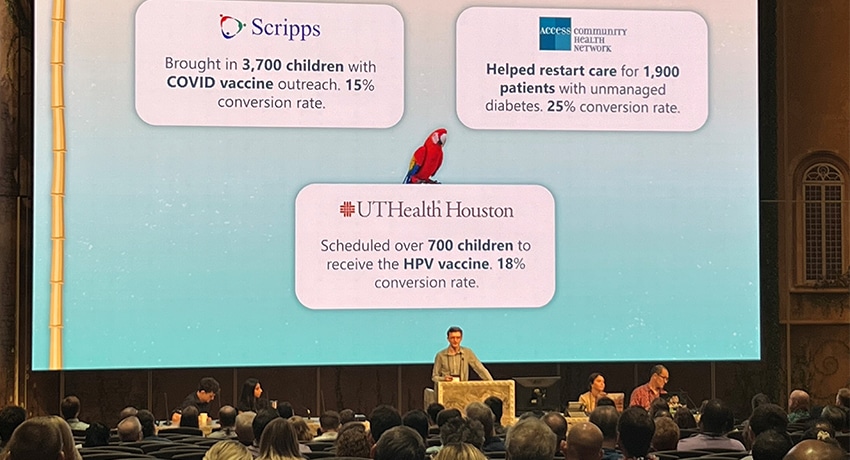UTHealth Houston technology executives and leaders attended Epic’s annual global conference Aug. 22-24 in Verona, Wisconsin. A “Castaway” theme served as the backdrop for the 10,000 attendees at this year’s UGM conference.
Thanks to successful results, Epic invited members of the UTHealth Houston team to present and showcase their best practices and lessons learned regarding two initiatives: campaigns and patient portal. Epic even cited UTHealth Houston’s HPV campaign as part of its “Ambulatory: Cool Stuff Ahead” talk.
HPV campaign
With the support of external funding, Yen-Chi Le, PhD, executive director of innovation & quality, and colleagues at UTHealth Houston Healthcare Transformation Initiatives (HTI) department, created the HPV campaign within Epic in response to Texas’ low HPV vaccination rates. Completion rates, for example, are 51.5% in Texas, which falls short of the national average of 61.7%. In fact, Texas ranked 48th among all states for HPV vaccine completion rates in 2021.

The goal was to use Epic’s campaigns platform to improve HPV vaccination rates among target patients (ages 9-26) with electronic reminders and compare scheduling rates between patients receiving usual care and those who received usual care and additional electronic reminders.
Le and Sandra Stansberry, MPH, assistant director of innovation & analytics with HTI, shared the study design, intervention, outcomes, and lessons learned in their session, “Improving HPV Immunization Rates Using Population Health Tools.”
“Our presentation really focused on finding quick wins for improving patient health outcomes by incorporating strategies from public health, research, and operations,” Le said.
One strategy that proved successful was crafting a brief, but powerful message. Le said messaging really matters when 180 characters or less are involved. Messages must be brief and leverage provider recommendation, as provider recommendation is the strongest predictor of vaccine uptake.
Stansberry believes that using technology to streamline and automate patient outreach, like what campaigns offers, has a significant impact on increasing vaccination rates by targeting specific patient groups, providing educational resources, and encouraging them to take action.
“Our work not only showcases the capabilities of Epic’s tools but also highlights how to use these tools in a creative and innovative manner to address public health challenges,” Stansberry said.
Patient portal

Epic invited Lindy Anderson-Papke, MHA, executive director of clinic operations performance improvement with UT Physicians, to discuss the various approaches to MyUTHealth Houston proxy access for adult and pediatric patients. She was part of a joint session with Stanford Medicine Children’s Health.
Proxy access is an important topic since it enables family members and caregivers to participate in a patient’s care. Anderson-Papke said proxy access for adults is fairly straightforward, and patients are encouraged to select access with the level of support they need from their family member or caregiver.
“There is a lot of interest in how organizations are addressing proxy configuration. Those are important conversations to have in health care as the digital space continues to expand,” Anderson-Papke said.
UTHealth Houston team members are already brainstorming topics to present at next year’s UGM conference.
Acknowledgement
The HPV campaign was partially funded by the UTHealth Houston Academic Excellence Endowment and donors to The University of Texas MD Anderson Cancer Center’s Annual Fund.


